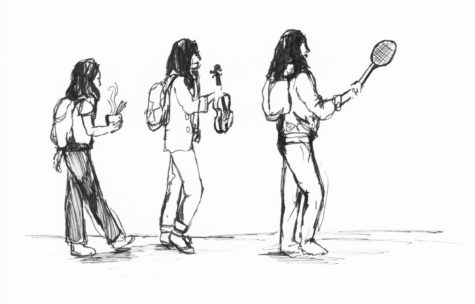A Chinese American Question & Answer

Racism: it’s lived through the ages. As a 17-year-old Chinese American female, I’ve heard my “fair” share of racist commentary, often in the form of insinuating questions. So from kindergarten to senior year, these are my answers to a few of the racial microaggressions I’ve heard.
Elementary school
Welcome to elementary school!
Kids are a very honest bunch, so prepare to be identified and sometimes alienated for being visibly different! You will most likely hear some form of the following questions:
“Can you even see clearly with your vision set on widescreen like that?”
Yes. I can see you very clearly.
“Do you know kung fu?”
No.
“Do you know any ninjas?” Who said I wasn’t a ninja?
“Do you eat rice every night?”
Do you eat casseroles every night?
“So what are you? Chinese, Korean or Japanese?”
I’m a kid. I’m a person. What are you?
Being singled out for my race made school lunches a difficult affair. Bringing Chinese food meant being subject to a slew of comments from my disgusted classmates, but typical bag lunch sandwiches didn’t appeal to my toddler appetite. My pork sung was “gross” and “hair-like,” my chow mein an unappetizing array of colors and my curry ridiculed for “looking and smelling like poop.” I’d often end up throwing away my food before anyone could see it. Or smell it.
Junior high school
Welcome to this uncomfortable stage of your life. In a few years, you will be cringing at your tweenage self (have fun). School isn’t as much of an afterthought now, so get ready for a lot of:
“Do your parents yell at you if you don’t get A’s in school?”
My parents push me to do the best I can, in any circumstances.
“Can you help me with my math homework?”
No. Math is my enemy.
“I thought you were supposed to be smart.”
I thought the same about you, so I guess we were both wrong.
“Do you play the violin and piano because your mom forced you to?”
I chose the violin because I felt like everyone expected me to in elementary school. I wish I chose the cello. I chose to play piano because I was jealous that my siblings could play but I couldn’t. I liked the sound, and I thought it was fun.
“Is yellow your favorite color?”
No. And just for that, I’m not telling you what my favorite color really is.
“You know, you look just like [insert East Asian celebrity of your choice (options include Mulan or Cho Chang or Lucy Liu or Jackie Chan or Bruce Lee or Mao Zedong)]?”
Oh really.
“So, where are you from?”
Illinois.
“No, where are you really from?”
I’m going to continue pretending I don’t know what you’re trying to ask and say “Illinois.”
Playing the “I’m-oblivious-to-racist-questions” game gets old quickly. As the subject of these microaggressions, it’s easy to start leaning into the racist commentary. Maybe you don’t want to be the one who “can’t take a joke,” or maybe you’re willing to act as the token Asian if it means people will like you. But playing the part means you’re not only giving others your permission to be racist, but perpetuating a behavior that many others are afraid to speak out about.
High school
It’s all the same racial digs and expectations as before, except more casually and quietly slipped into conversation.
“You used to play violin and piano? Well go figure. That’s like, in the rulebook for you guys, isn’t it?”
“She’s so small she’s like a grain of rice!”
“I’ve never had a real Chinese friend before.”
“You probably go to Chinatown all the time, right?”
“Well, I’m sorry if you guys all look alike!”
“Don’t worry, Asians love me.”
“You play badminton? Oh, that makes sense.”
“I’m not racist, I just think …”
I just think … at some point, I’m not the one being “weird” or “too sensitive.” I don’t have to keep ignoring my discomfort for the sake of an easy conversation. This isn’t the first exasperated piece written by a fed-up Asian American, because racial microaggressions aren’t new. But they certainly haven’t been extinguished either, and they never will be if the issue is forgotten or dismissed.
I’ve heard and quietly set aside every unsettling and alienating assumption that ever pricked my ears, even laughing it off at times. I’ve denied the influence these assumptions have had on my life, until now. There’s no more room in the dusty back corners of my mind to keep pushing and pressing my experiences into. The only place to put them is on this page.
So what am I? Chinese, Korean or Japanese?
I’m done.
I hope that answers all your questions.

